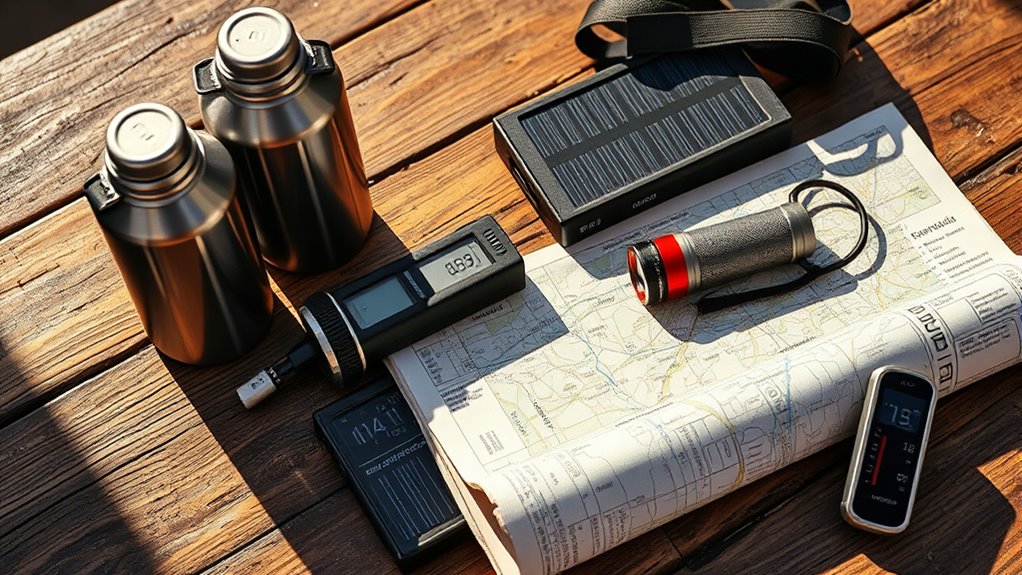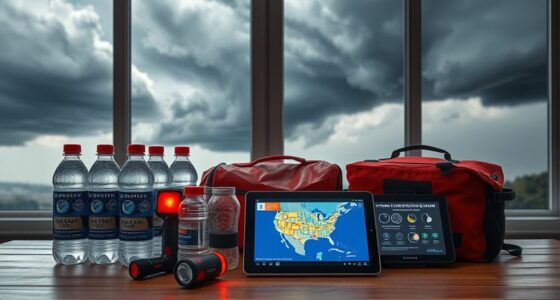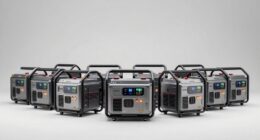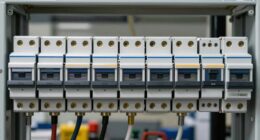To prepare for a heat wave power outage, you should reinforce your home with ventilation strategies like opening windows during cooler times and use backup power sources such as portable generators or battery systems. Stock up on essential supplies including water, non-perishable food, batteries, and cooling accessories. Stay cool by using battery-powered fans and applying cooling towels, and protect vulnerable family members with extra hydration and monitoring for heat-related symptoms. Continuing to explore these tips helps you better protect your loved ones during extreme heat.
Key Takeaways
- Prepare backup power sources like generators and portable chargers to maintain essential devices during outages.
- Stock sufficient bottled water, non-perishable food, cooling aids, and medications for extended heat events.
- Implement ventilation strategies by opening windows during cooler hours and using fans for airflow.
- Keep vulnerable family members hydrated, cool, and monitor for heat-related symptoms, seeking medical help if needed.
- Limit outdoor activities, close blinds during peak heat, and stay informed through emergency communication channels.
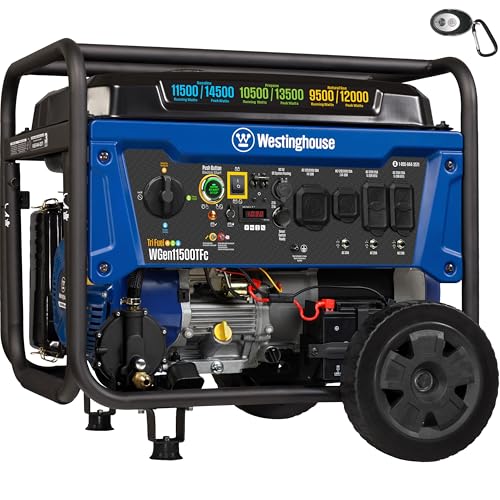
Westinghouse 14500 Peak Watt Tri-Fuel Home Backup Portable Generator, Remote Electric Start, Transfer Switch Ready, Gas, Propane, and Natural Gas Powered
Perfect as a backup power source for larger homes or a dependable source of portable power
As an affiliate, we earn on qualifying purchases.
As an affiliate, we earn on qualifying purchases.
How Can I Prepare My Home for a Heat Wave Power Outage?
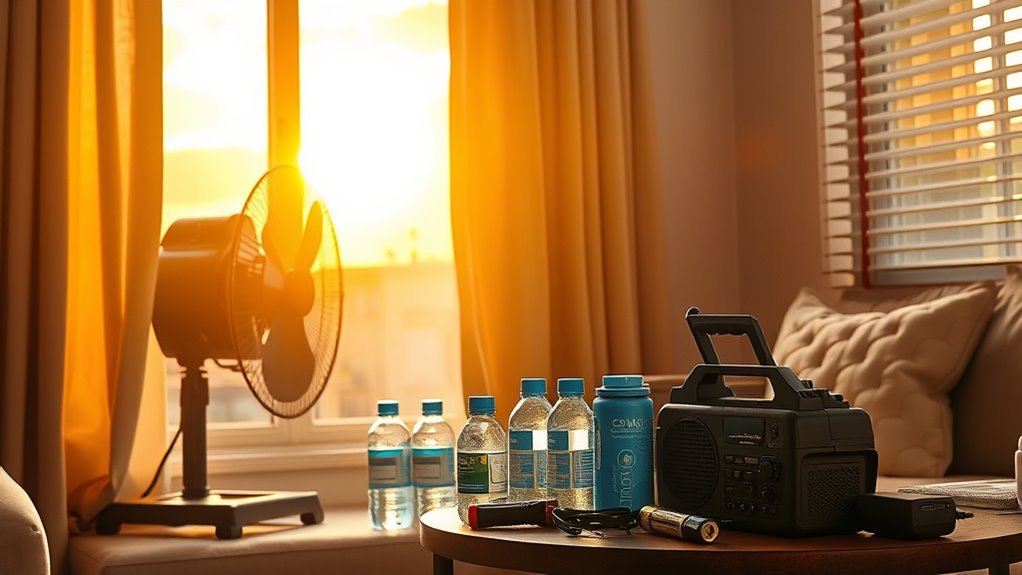
When a heat wave hits and power outages occur, it’s essential to take proactive steps to keep your home safe and comfortable. One key strategy is implementing effective ventilation strategies, like opening windows during cooler parts of the day and using fans to promote airflow. These tactics help reduce indoor temperatures naturally. Additionally, consider backup power options such as portable generators or battery systems to keep essential appliances running, like fans or small air conditioning units. Proper planning guarantees you can maintain a comfortable environment without relying solely on grid power. Regularly check your backup power equipment to ensure it functions correctly when needed. Utilizing electric bike generators can also be an eco-friendly way to produce small amounts of electricity during outages. Combining ventilation techniques with reliable backup power options prepares your home to better withstand the heat and outages.
![Wavmill Battery Operated Fan [200H Max], 2 in 1 D-Cell Battery & USB Powered Fans, Portable Camping Fan with 4 Speeds, Light, Timer, Remote for Outdoor Tent, Travel, Picnic, Office, Bedroom - Black](https://m.media-amazon.com/images/I/51cfe5EEl7L._SL500_.jpg)
Wavmill Battery Operated Fan [200H Max], 2 in 1 D-Cell Battery & USB Powered Fans, Portable Camping Fan with 4 Speeds, Light, Timer, Remote for Outdoor Tent, Travel, Picnic, Office, Bedroom – Black
【2 IN 1 D-cell Battery & USB Powered Fan】 Extend more power options with this portable fan! When…
As an affiliate, we earn on qualifying purchases.
As an affiliate, we earn on qualifying purchases.
What Emergency Supplies Should I Have on Hand?
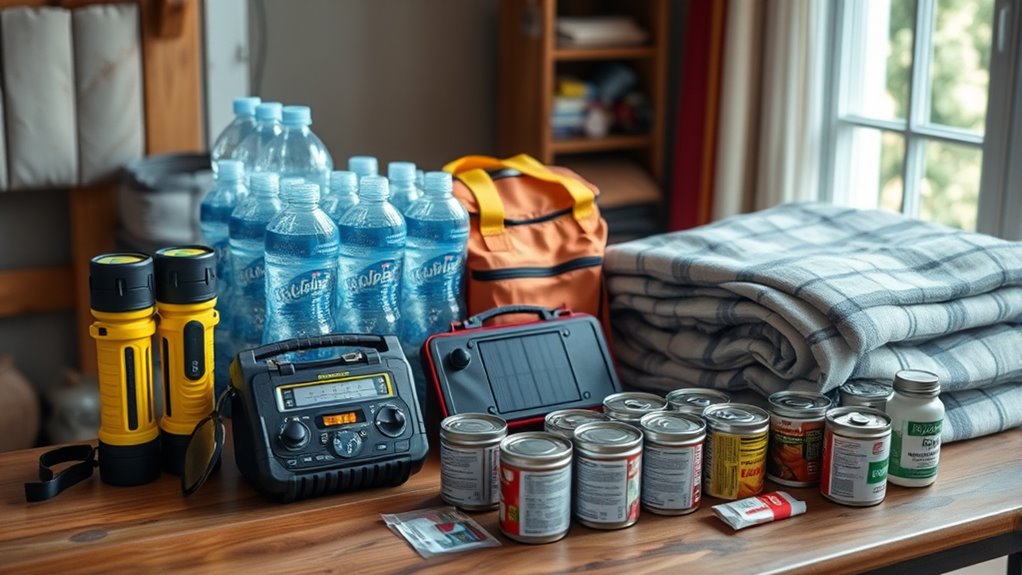
Having the right emergency supplies ready can make all the difference during a heat wave power outage. Start with a well-stocked emergency kit that includes bottled water, non-perishable snacks, and essential medications. Include cooling methods such as battery-powered fans, cooling towels, or hand-held fans to help regulate body temperature. Make sure you have extra batteries and portable chargers for your devices. Consider adding a first aid kit, flashlight, and extra clothing to your supplies. Don’t forget personal hygiene items and any special needs items for infants or seniors. Preparing these essentials guarantees you’re equipped to stay safe and comfortable until power is restored. Having these supplies on hand minimizes risk and helps you respond quickly during an emergency. Additionally, practicing creative storytelling techniques can help communicate safety plans effectively to family members and neighbors, ensuring everyone knows how to stay safe during an outage.

Sukeen 4 Pack Cooling Towels (40"x12"), Cooling Neck Wraps, Ice Towel, Soft Breathable Chilly Towel,Microfiber Towel for Yoga,Sport,Running,Gym,Workout,Camping,Fitness,Workout & More Activities
INSTANT COOL AND REUSABLE: Hyper-evaporative breathable mesh material makes it easy to activate the chilling towel when you…
As an affiliate, we earn on qualifying purchases.
As an affiliate, we earn on qualifying purchases.
How Can I Stay Cool and Safe Without Electricity?
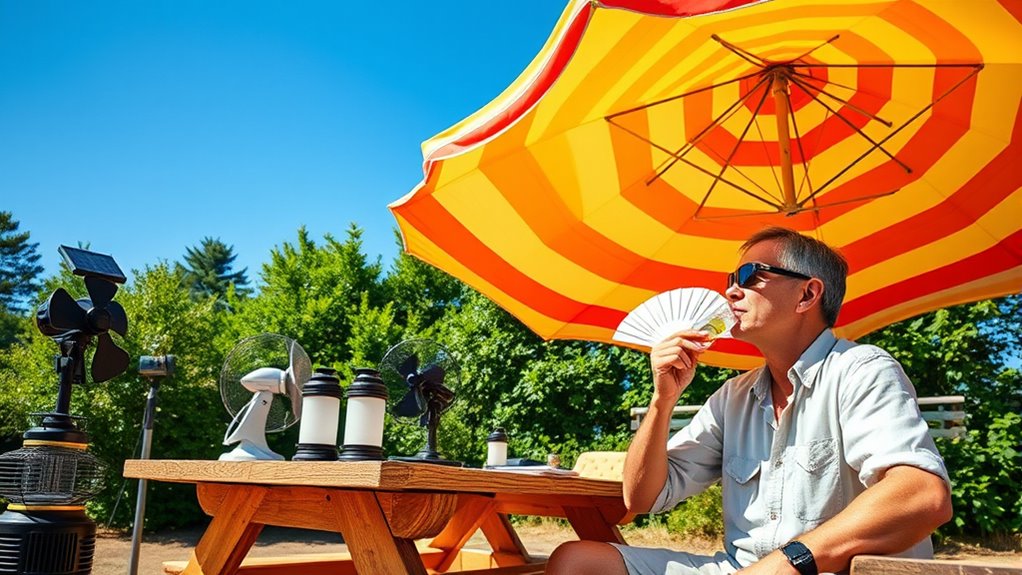
During a heat wave power outage, staying cool and safe without electricity requires practical strategies. First, use portable fans powered by batteries or hand-crank models to improve air circulation. Second, apply cooling towels around your neck or forehead to lower your body temperature quickly. Third, create shade by closing blinds or curtains during the hottest part of the day, and stay in cool, shaded areas as much as possible. Hydrate frequently with water and avoid strenuous activities. Wear lightweight, loose-fitting clothing to help your body stay cool. Keep windows open at night to let cooler air in, then close them during the day to trap coolness inside. Additionally, using air purifiers with proper maintenance can help improve indoor air quality and comfort when temperatures are high and fresh air circulation is limited. These simple steps help maintain safety and comfort until power is restored.

Datrex Emergency Water Packet 4.227 oz – 3 Day/72 Hour Supply (18 Packs) , White
Emergency purified water for immediate use; lightweight and extremely compact
As an affiliate, we earn on qualifying purchases.
As an affiliate, we earn on qualifying purchases.
What Should I Do if the Power Outage Lasts for an Extended Period?
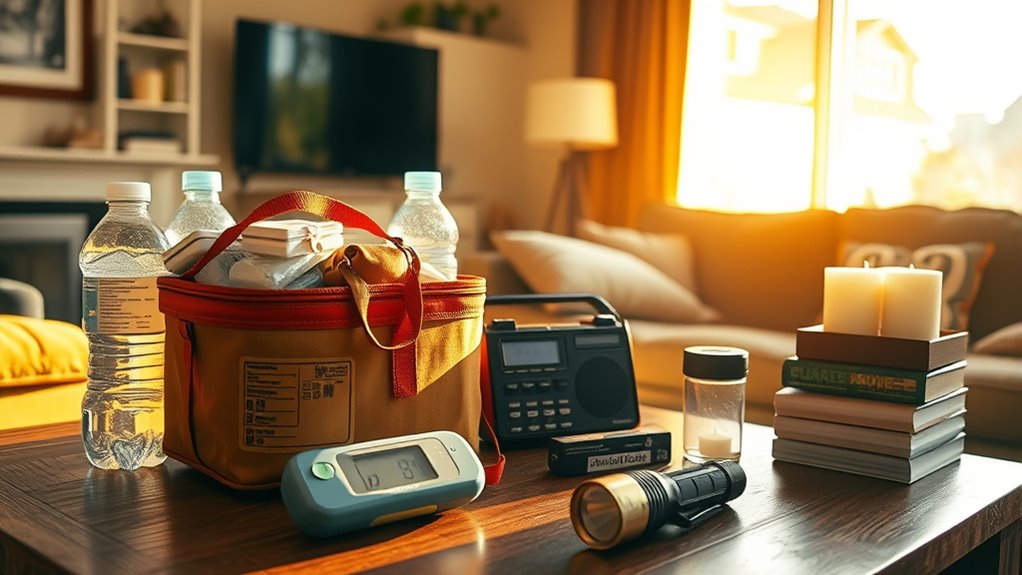
If the power outage stretches on for an extended period, it’s essential to prioritize safety and resource management. Use alternate cooling methods like damp cloths, battery-operated fans, or visiting cooler public spaces if available. Stay hydrated and avoid strenuous activity to prevent heat-related illnesses. Keep emergency communication devices charged with backup power sources, such as portable chargers or car adapters, so you can stay informed and connected. Check in on neighbors, especially those who might need extra assistance, but do so safely. Limit opening refrigerators and freezers to conserve their cold. Remember, maintaining calm and staying connected through emergency communication channels helps you make informed decisions and prevents panic during prolonged outages. Additionally, being aware of heat wave risks can help you better prepare for extreme weather conditions.
How Can I Protect Vulnerable Family Members During a Heat Wave Outage?

Protecting vulnerable family members during a heat wave outage requires immediate action to keep them safe and comfortable. Focus on effective cooling techniques and medical preparedness. First, ensure they stay hydrated by encouraging frequent water intake. Second, use fans, cool cloths, or damp towels to help lower body temperature. Third, identify and prepare any necessary medications or medical devices they rely on, and have a plan for quick access if symptoms worsen. Keep an eye on signs of heat-related illness, like dizziness or confusion. If needed, seek medical attention promptly. Proper planning and quick action can make all the difference in safeguarding your loved ones during a heat wave outage. Additionally, understanding the benefits of glycolic acid can help you maintain your skin health even during stressful situations.
Frequently Asked Questions
How Can I Backup My Essential Electronic Devices During Outages?
To support your essential electronic devices during outages, you should use portable chargers and consider solar power options. Keep portable chargers fully charged and easily accessible for quick use. Investing in solar-powered chargers can provide a sustainable energy source when traditional power is unavailable. Regularly test your backup devices, and store them in a cool, dry place to guarantee they’re ready to use when needed.
What Are the Best Ways to Conserve Water During a Heat Emergency?
Worried about running out of water during a heat emergency? You can conserve water by taking quick showers instead of baths, fixing leaks promptly, and avoiding unnecessary watering of your garden. Use a broom instead of a hose to clean outdoor areas, and collect rainwater for outdoor use. These simple water conservation tips help stretch your supply, making sure you have enough during a heat emergency, keeping everyone safe and cool.
How Do I Handle Food Storage Without Refrigeration?
During a heat emergency, handle food storage by focusing on non-perishable foods that don’t require refrigeration. Store these items in a cool, shaded place to prevent spoilage. Use insulated containers or coolers with ice packs for perishable items when possible. Keep food covered and off the ground to avoid contamination. Regularly check for signs of spoilage, and prioritize eating perishable foods first to stay safe.
Are There Community Resources for Heat Wave Power Outages?
When heat waves hit and power outages strike, you can turn to community centers and relief programs for support. These resources offer cooling spaces, water, and assistance with essential needs, making tough days more manageable. While the heat saps your energy, these programs stand as a refuge, helping you stay safe and comfortable. Reach out early, stay connected, and utilize local resources to navigate the heat wave more effectively.
How Can I Communicate With Authorities if Phone Service Is Down?
If phone service is down, you can still communicate with authorities using emergency radios or satellite communication devices. Emergency radios, such as NOAA weather radios, can keep you updated and send alerts. Satellite communication allows you to send and receive messages even when cellular networks are unavailable. Make sure to keep these devices charged and accessible, so you’re prepared to stay connected and seek help during a heat wave power outage.
Conclusion
Preparing for a heat wave power outage guarantees your safety and comfort. Stock emergency supplies, stay hydrated, and find cool spots in your home. Keep vulnerable family members protected and have a plan for extended outages. Remember, a stitch in time saves nine—being proactive now can prevent bigger problems later. Stay calm, stay prepared, and you’ll weather the heat wave safely. Your readiness makes all the difference in facing the unexpected.
